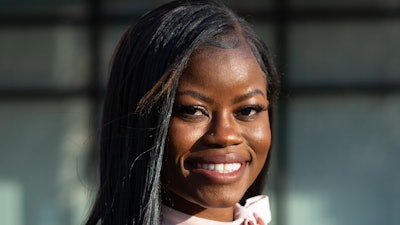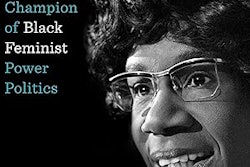Favour Nerrise was interested in engineering even before she knew what it was. As young as 5 growing up in Cameroon, Favour was the one her family relied on to repair a broken television or telephone.
“I don’t know how or why, but I knew how to fix everything,” she said.
But Nerrise didn’t have a lot of guidance on how to channel her abilities.
“Exposure to engineering doesn’t really exist for my family,” she said. “Growing up, there wasn’t really anyone telling me that engineering was a path I could take. For a Black, African woman, no one is really telling you to become an engineer.”
Nerrise credits her mother with fostering her interests.  Favour Nerrise
Favour Nerrise
“My mom has the best tenacity in the world,” she said. “She would put me in every program possible. She didn’t go to college, but if I told her I found a flyer for something, she’d drive me, she’d pay for it, she’d make sure I got there.”
Nerrise competed in robotics, math, and science contests and spelling bees. She participated in summer programs at Johns Hopkins and MIT. And although she said she felt like she was just having fun and making friends, she was beginning to chart her path as an electrical engineer.
Now, at Stanford, Nerrise is trying to improve diagnoses for people with neurodegenerative disorders, such as Parkinson’s disease. She uses engineering principles to try to identify biomarkers that can help spot diseases earlier on so that they can be tracked.
Dr. Ehsan Adeli, an assistant professor at Stanford and one of Nerrise’s mentors in this work, praised her care, diligence, and ability to translate highly technical material into plain English.
“Everything you want from an excellent Pd.D. student, she has,” Adeli said. “She’s still finishing her second year, but she’s already more mature than even more senior researchers and Ph.D. candidates.”
But Adeli noted that what truly sets Nerrise apart is her work outside of the lab. Nerrise is also deeply concerned about neuro-ethics and serves on several committees tasked with examining issues surrounding neuro-ethics.
“We’ve developed tools that generate tremendous data that we could eventually collect from the brain,” Nerrise said. “We don’t explain to the layperson enough what that truly means for us to own and use that data. It might end up causing more disadvantages in the system.”
Nerrise said she hopes to create a podcast to bring together experts and regular people so that they can develop shared understandings of these issues. She said she feels a responsibility to help people in the same position that she was — aspiring engineers from minoritized backgrounds.
“There’s a major need to have Black engineers in positions of power so that other young Black kids will be able to see that engineering is a calling for them,” Nerrise said. “I got very blessed by stumbling into it, but don’t want that to be the same story for everybody else.”
Nerrise is the two-time president of the National Society of Black Engineers, an organization that she has been a part of since she was nine. She credits the group with helping her find belonging when she was struggling with people who looked at her weirdly or refused to pronounce her name correctly. As president, she focused on rebuilding the membership after COVID-19 and learned a lot about leadership.
“I was 21 years old, and I got to run a multimillion-dollar organization,” Nerrise recalls. “I think it’s absolutely insane to get that opportunity.”
Nerrise describes the role as the most fulfilling experience she has had so far. “They have me for life, for sure,” she said. “It’s my calling.”
Nerrise remains undecided about exactly what she’ll do after she gets her degree. Academia, entrepreneurship, and policy are all options. But Adeli is confident that no matter where she lands, Nerrise will make an impact. Adeli predicts, “she definitely will be a leader in neuroscience and machine learning.”


















